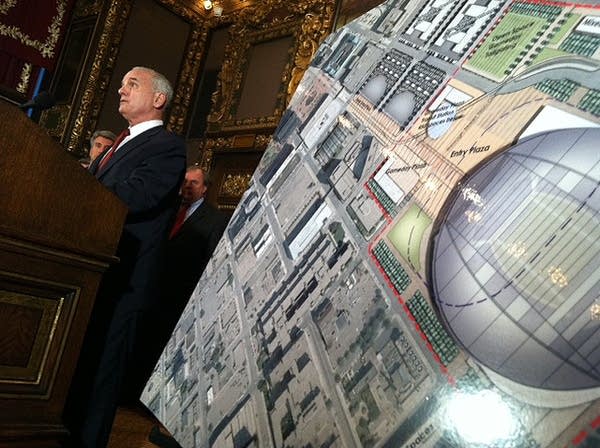Stadium: Why the Minneapolis City Council vote matters
Go Deeper.
Create an account or log in to save stories.
Like this?
Thanks for liking this story! We have added it to a list of your favorite stories.

Gov. Mark Dayton said a deal to build a new Vikings stadium is contingent not only on the support of the state Legislature, but also on the approval of the Minneapolis City Council. The plan faces uncertain prospects in both bodies.
Under state law, the Legislature has the power to pass the proposal without the city's permission. Local support is key to the project.
The stadium bill isn't out yet, but Dayton's point man on the project, Ted Mondale, said the Minneapolis City Council will have a vote, because of something called a "special law," -- a law which applies only to one city, county or geographic area.
"It requires by law that the local jurisdiction, in this instance Minneapolis, vote for that," Mondale said.
Turn Up Your Support
MPR News helps you turn down the noise and build shared understanding. Turn up your support for this public resource and keep trusted journalism accessible to all.
For example, if the legislature wants some of the sales and hospitality taxes collected in Minneapolis to go toward a new Vikings Stadium, the state constitution would require the approval of the Minneapolis City Council.
There's an exception to that rule, said University of Minnesota law professor Fred Morrison.
"There's a big if, because the Legislature has the power if it passes a general law that applies to, for example, all football stadiums, then it wouldn't have to have local approval," Morrison said.

In other words: The Legislature has the ability to circumvent the City Council. But Dayton said he's not interested in doing that.
"The Legislature would then be preempting local decision making authority, and I wouldn't think that's a good approach," Dayton said. "Given that there's a local contribution by the city of Minneapolis of $150 million to the project, then certainly the city council and the mayor ought to have a say in that decision."
When the Legislature passed the bill for the Twins' Target Field ballpark back in 2006, the local funding came from Hennepin County. The county board had to approve an increase to local sales tax to pay for it.
Hennepin County Commissioner Mike Opat said local approval is critical for these types of projects, because the state uses local taxes to help pay for them.

"Many state legislators want the Twins, Vikings, Wild and Wolves to play in Minnesota. None of them would prefer that they leave, but also many of them — it's clear that a majority of them would rather not have to pay for that," Opat said.
Under the Vikings stadium plan, the state contribution of nearly $400 million would not come from taxes, but from expanded gambling.
The city would contribute $150 million toward building the stadium, and $7.5 million annually toward operating the facility.
There are currently four Minneapolis city council members who have announced their support for the project. City Council President Barbara Johnson is one of them, and she is working to convince at least three more of her colleagues to join her.
"I am doing my best to try to put the votes together," Johnson said.
Seven votes are required to pass the plan. Johnson would like to take a symbolic vote of support at the city council even before the Legislature takes action on the stadium proposal.
"They want an indication of whether Minneapolis is supportive of this. And that's what I'm telling my colleagues," Johnson said. "We're talking about a billion dollars worth of investment. Do we want that to go to another city?"
But there is a strong bloc of opposition on the council. A number of members say if stadium supporters want city approval, the people of Minneapolis should also vote on the stadium, and not just the city council.
Dear reader,
Political debates with family or friends can get heated. But what if there was a way to handle them better?
You can learn how to have civil political conversations with our new e-book!
Download our free e-book, Talking Sense: Have Hard Political Conversations, Better, and learn how to talk without the tension.





